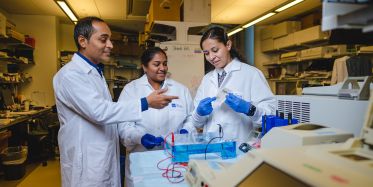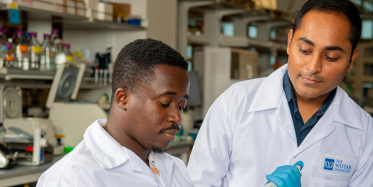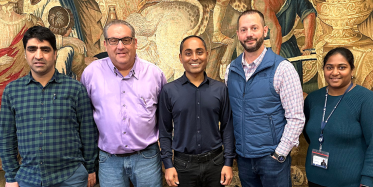Rahul S. Shinde, D.V.M., Ph.D.
-
Assistant Professor, Molecular and Cellular Oncogenesis Program, Ellen and Ronald Caplan Cancer Center
Shinde is an immunologist with interest in characterizing key factors in the tumor microenvironment and gut microbiome that contribute to the refractory nature of cancer and target them for therapies.
Shinde obtained his D.V.M. from Nagpur Veterinary College, India, and his Ph.D. in immunology from the Augusta University. Before joining Wistar as the first/inaugural Caspar Wistar Fellow, he trained as a postdoctoral fellow in the Tumor Immunotherapy Program at the Princess Margaret Cancer Center in Toronto, Canada.
The Shinde Laboratory

The Shinde Laboratory
The tumor microenvironment (TME), consisting of stroma, immune cells and extracellular matrix, is a key determinant of cancer initiation, progression and resistance to therapies. Understanding the heterogeneity of the TME and the molecular mechanisms contributing to immune responses is critical to enhance immunotherapy and prevent/overcome resistance. Macrophages are major components of the TME and regulate inflammation, angiogenesis, extracellular matrix remodeling, and T-cell suppression. Alterations in the metabolism of macrophages affect their function. Research in the Shinde lab focuses on characterizing the molecular mechanisms underlying metabolic plasticity in macrophages during tumorigenesis.
Commensal microbiota residing in the gut can also modulate the TME and affect tumor progression and response to therapy. Host, dietary and environmental factors contribute to changes in the microbiome. The lab is also interested in characterizing the healthy/symbiotic or disease-modulating/dysbiotic microbiome and its crosstalk with immunometabolism during disease development.
-
Postdoctoral Fellows
Sajad Ahmad Bhat, Ph.D.
Marina Domingovidal, Ph.D.
Gauri Mirji, Ph.D. -
Graduate Student
Sarah Kim Reiser
-
Research Assistant
Siva Pushpa Gavara
-
A postdoctoral fellow position is available in the Shinde lab. Applicants should have or be close to obtaining their doctoral degree (or equivalent) in biomedical sciences or a related field.
The ideal candidate will have experience in immunology, cancer biology, macrophage function, mouse modeling, and relevant experience with the gut microbiome. Interested applicants should submit a cover letter summarizing past and future research interests, CV, two references, and reprints of two supporting publications (optional) to Dr. Shinde at rshinde@Wistar.org.
Research
The first project in our laboratory seeks to understand how host metabolism impacts disease progression and therapy resistance in pancreatic cancer. Tumor metabolism in pancreatic cancer is known to be dysregulated both in neoplastic and in tumor microenvironment (TME) cells, significantly altering immune responses. Metabolic profiling has identified increased plasma levels of branched-chain amino acids (BCAA) in a variety of disorders including pancreatic ductal adenocarcinoma (PDAC). Our new work shows that transcriptional regulators of BCAA oxidation, such as Krüppel-like factors (KLF), are linked to the phenotype of tumor-associated macrophages (TAMs). This project seeks to elucidate the functional implications of KLF biology and BCAA catabolism in TAMs for driving tumor progression and resistance to therapy.
The second project in our lab investigates the connections between gut microbial metabolic pathways and therapy response. Immune responses can be altered by metabolic processes occurring outside the TME, for example, by metabolites produced by gut bacteria. Recent studies show that particular species of gut bacteria influence PDAC outcomes and response to therapy and do so by altering innate and adaptive immunity; however, the specific mechanisms are not clear. This project seeks to identify the metabolic pathways by which the gut microbiome influences antitumor immune responses, impacting PDAC burden and therapy response.
Our studies will have potential clinical impact providing insights into previously unsuspected targets for cancer therapy. More broadly, we expect our findings to shed light on how diet, host metabolism and gut microbiome are linked in shaping immune function and therapy response.
-
Staff Scientist
Gauri Mirji, Ph.D.
-
Associate Staff Scientist
Sajad Ahmad Bhat, Ph.D.
-
Postdoctoral Fellow
Erin Gibbons, Ph.D.
-
Graduate Students
Behnaz Mansoori
Sarah Kim Reiser -
Research Assistant
Siva Pushpa Gavara
-
Learn about job opportunities at The Wistar Institute here.
Shinde Lab in the News
Selected Publications
The Microbiome-derived Metabolite TMAO Drives Immune Activation and Boosts Responses to Immune Checkpoint Blockade in Pancreatic Cancer.
Mirji , G., Worth, A., Bhat, S.A., Sayed, M.E., Kannan. K.T., Goldman. A.R., Tang, H., Liu, Q., Auslander, N., Dang, C.V., et al. “The Microbiome-derived Metabolite TMAO Drives Immune Activation and Boosts Responses to Immune Checkpoint Blockade in Pancreatic Cancer.” Sci Immunol. 2022 Sep 9;7(75):eabn0704. doi: 10.1126/sciimmunol.abn0704. Epub 2022 Sep 9.
Tryptophan-derived Microbial Metabolites Activate the Aryl Hydrocarbon Receptor in Tumor-associated Macrophages to Suppress Anti-tumor Immunity.
Hezaveh, K., Shinde, R.S., Klötgen, A., Halaby, M.J., Lamorte, S., Ciudad, M.T., Quevedo, R., Neufeld, L., Liu, Z.Q., Jin, R., et al. “Tryptophan-derived Microbial Metabolites Activate the Aryl Hydrocarbon Receptor in Tumor-associated Macrophages to Suppress Anti-tumor Immunity.” Immunity. 2022 Feb 8;55(2):324-340.e8. doi: 10.1016/j.immuni.2022.01.006.
Apoptotic cell-induced AhR activity is required for immunological tolerance and suppression of systemic lupus erythematosus in mice and humans.
Shinde, R., Hezaveh, K., Halaby, M.J., Kloetgen, A., Chakravarthy, A., da Silva Medina, T., Deol, R., Manion, K.P., Baglaenko, Y., Eldh, M., et al. “Apoptotic cell-induced AhR activity is required for immunological tolerance and suppression of systemic lupus erythematosus in mice and humans.” Nat Immunol. 2018 Jun;19(6):571-582. doi: 10.1038/s41590-018-0107-1. Epub 2018 May 14.
Reactive oxygen species modulate macrophage immunosuppressive phenotype through the up-regulation of PD-L1.
Roux, C., Jafari, S.M., Shinde, R., Duncan, G., Cescon, D.W., Silvester, J., Chu, M.F., Hodgson, K., Berger, T., Wakeham, A., et al. “Reactive oxygen species modulate macrophage immunosuppressive phenotype through the up-regulation of PD–L1.” Proc Natl Acad Sci U S A. 2019 Feb 15. pii: 201819473. doi: 10.1073/pnas.1819473116. [Epub ahead of print]
The Aryl Hydrocarbon Receptor: Connecting Immunity to the Microenvironment.
Shinde, R., McGaha, T.L. ”The Aryl Hydrocarbon Receptor: Connecting Immunity to the Microenvironment.” Trends Immunol. 2018 Dec;39(12):1005-1020. doi: 10.1016/j.it.2018.10.010. Epub 2018 Nov 5.


